Outside Bernie Sanders’ rally in Minnesota last week, Americans were bracing for coronavirus outbreak—something public health officials had warned was imminent. But inside St. Paul’s Roy Wilkins Auditorium, it was mostly political business as usual: 6,000 Sanders supporters packed into the venue to see the Vermont progressive; media converged to cover the senator; and Ilhan Omar, one of the candidate’s top surrogates, called on the crowd to hold hands.
To this point, Sanders, Joe Biden, and Donald Trump, for whom boisterous rallies are a staple, have campaigned as usual, despite the spread of Covid-19, which is prompting major companies and universities to operate remotely. But as the novel virus continues to spread across the United States, it is threatening to upend both the presidential race and the election process as a whole, just as it has done with global markets. In Washington state, where voters cast primary ballots this week, and other upcoming contests, officials are considering how to run an election amid concerns about community spread. Candidates—all of whom are in their 70s, leaving them more vulnerable to severe impacts of the virus—are being confronted with questions about if and how they will adapt their campaigns to account for the Covid-19 threat. And the public health issue has already begun morphing into a political issue for the president, whose handling of the mounting crisis has been marred by chaos and confusion.
Washington, which votes by mail Tuesday, is considering how its primary could worsen the spread of the virus; the Evergreen State has been the nation’s hardest hit. “We’re telling all of the people who handle incoming ballots to use gloves,” Washington Secretary of State Kim Wyman told the New York Times. “We’ve also had a recommendation from National Guard: ‘Folks, you might consider masks.’” Other upcoming primary states, including Illinois, which just confirmed its seventh case, will likely have to make similar preparations. And, should coronavirus fail to “miraculously” disappear later this spring, as Trump has predicted, the ordeal could present significant challenges during the general election. “We don’t have a plan for what happens if a part of the country faces a disruption on a presidential Election Day,” Rick Hasen, an election law expert at the University of California-Irvine law school, told the Times. “What if one part of the country is affected, if it’s California or Florida?”
Beyond the logistical headaches coronavirus could cause, it may also change the way candidates campaign, potentially forcing candidates to forgo rallies, handshakes, and other typical features of politicking. That could most hurt Trump and Sanders, who thrive among their ardent supporters in rally settings. Those candidates, along with Biden, have suggested they will keep holding large-scale public events. “I’m not concerned at all,” Trump said Saturday when asked about coronavirus concerns. “Right now, we’re running as hard as we can,” Sanders told CNN’s Jake Tapper. “We’re listening to the experts at the CDC and doing everything they recommend,” Biden said at a campaign stop.
All that, of course, could change. Across the globe, hard-hit countries like China, where the virus originated, and Italy, which has the most cases outside of Asia, have taken drastic measures to combat the spread, including banning large public gatherings. The U.S. has not yet required such measures, but some high profile events, like South by Southwest in Austin, have been canceled amid spiking fears. The possibility of more cancellations has loomed as additional cases crop up—including a man who attended the same conservative conference last month Trump and other high profile Republicans. The White House has said the president did not interact with the man at CPAC, but Senator Ted Cruz and and Representative Paul Gosar did, and are now in self-quarantine.
With concerns about the administration’s preparedness continuing to mount, and the stock market Trump has long touted as his signature achievement going haywire, the president’s bumbling response to the crisis could become a major barrier to his reelection. “The administration didn’t see this coming,” Democratic Senator Chris Murphy said Sunday. “This president has created a culture of misinformation in which no one wants to give him bad news. And that created a disincentive in the White House and in the administration to come up with an early test.”
By Eric Lutz [Vanity Fair]

